Clipper was a Packard nameplate for several years, first between 1941-47 (with time off for WW2) and again from 1953-57. But the ’57 models were quite different than the Clippers that had come before, reworked Studebaker Presidents which were smaller and leaner. Sales fell and they disappeared after 1957, and the whole brand did as well a year later. This ’57 Packard Clipper is a two-owner car and has been in storage since 1984. It’s been made to run but isn’t yet roadworthy. From Orange, California, this Clipper is available here on eBay where the bids tally $6,900 so far, but there is a reserve to be dealt with.
Packard named its Clippers after the type of a sailing ship. In the beginning, it was considered a luxury car like the rest of the company, but over time it became the automaker’s lowest-priced nameplate, so it was spun off as a marque of its own for 1956 only. By then, the impacts of the merger between Studebaker and Packard had surfaced, and the car became a rebadged Studebaker in 1957 as the company strived to survive. In 1957, Packard dealers had to be a lonely place to work as only 3,940 Clipper sedans were sold, like the seller’s car. A station wagon version added 869 more to the count. Studebaker-Packard pulled the Clipper’s plug after that.
As a car dealer back in the day, the seller would buy interesting autos with the intent of restoring them and then moving on. This Clipper is one of the cars that did not make it through that process, getting shuffled to the back of the shop while other more interesting projects always seemed to come along. Acknowledging the car’s rebirth will not happen on his watch, the seller has put this Packard up for sale with what he believes are less than 24,000 actual miles.
We’re told the car was sold new in California and may never have left Orange County. After sitting for 37 years, the seller brought the car out, cleaned out the fuel system, installed a battery. and got it running with little fanfare. It’s a “neighborhood” runner for the moment as the automatic transmission is sluggish and the tires are older than dirt. So, someone with mechanical skills needs to go through the Packard with a fine-tuned comb.
The car’s dark green paint isn’t bad for 64 years but has its share of patina (especially on the roof) and there are a few small rust spots, such as at the bottoms of the front fenders. The interior may have suffered the most over time, with the upholstery and dash panels cracked from age. And the headliner and carpeting are also due to be replaced. All the lights are in working order as are the power windows in the front doors, but not the back. If you want to see a video of the car running, the seller can accommodate you.
This is the kind of automobile you could get going in top shape and worry about the rest as you go. Whether restored or not, this Packard is likely to draw attention at local car shows because no one else is likely to be sporting one of the “Packardbakers” as they became known during and after the marque’s demise. This car has Studebaker’s 289 cubic inch V8 with a supercharger and yet Hagerty only rates it being worth no more than $20,000 when restored.
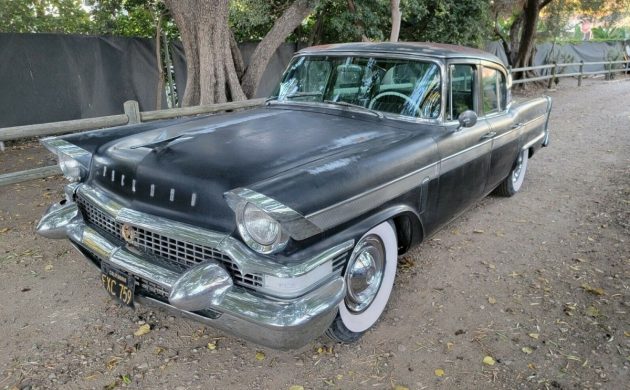
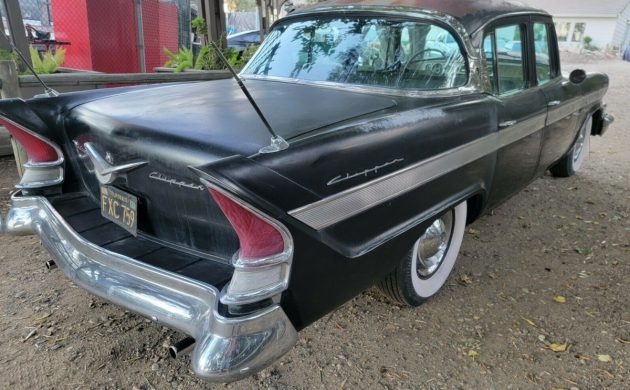
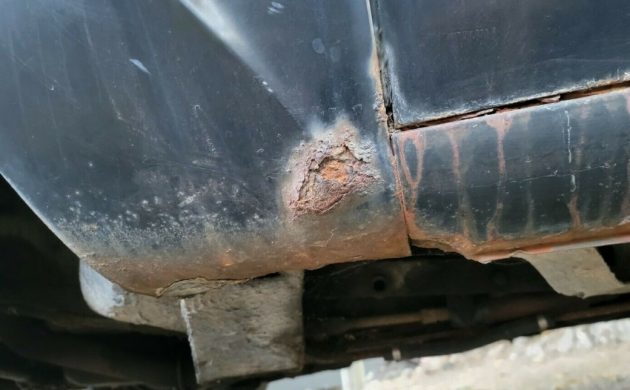
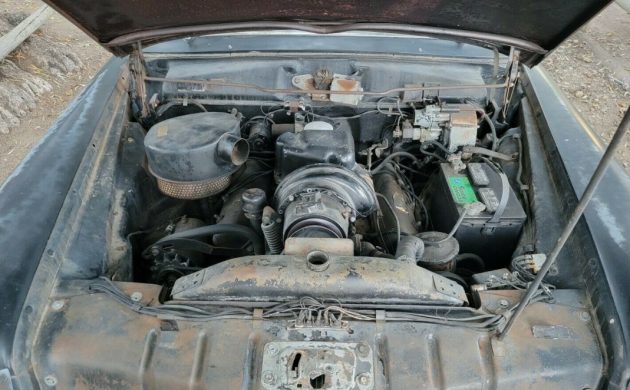
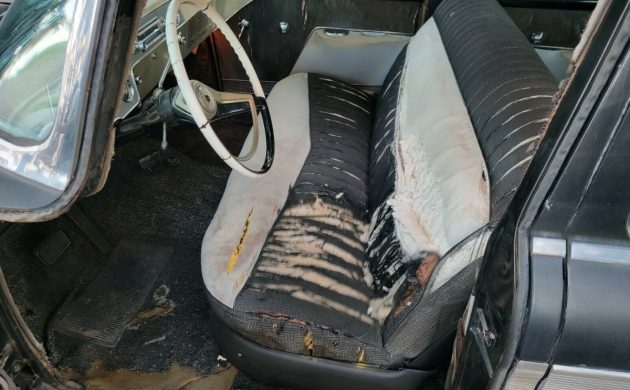
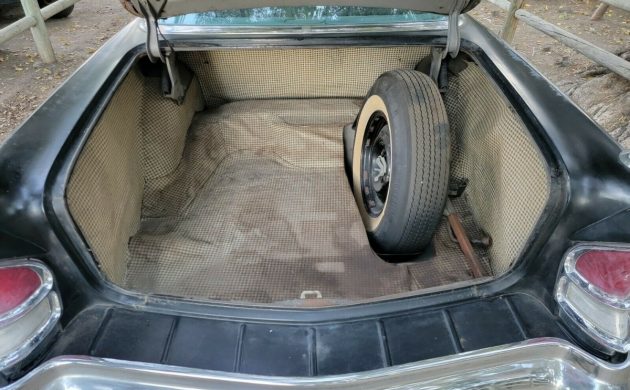




Drivers section of the front seat has a lot more wear proportionately, which leads one to wonder how it could have 24K miles
Five will get you 124k miles if not more. The seat doesn’t get that kind of shredding just from sitting.
Guys, I’ve owned 2 of these. I drove a low mileage version in high school, back in the late 1960s. Even then this very poor quality seat material tended to shred wherever it was touched. This is one of the better examples I’ve seen. Same for the headliner, but it’s easy to replace, it’s the same as a 1957 Studebaker President Classic sedan. The seat and door panel material, at least 20 years ago, was not available, but there are other materials that come close, but the specific rectangle design is not correct.
More like 124K to me. They should’ve put
the 275 horse 352 V-8 in these cars. If they
had, they might’ve had the makings of a great muscle car. I’ve always liked Packards and did, for awhile own a ’50 9-
passenger limousine. This didn’t sit too
well with my uncle, who was a Cadillac man. He always called the ’57-’58 models
Stupid Packards.
Unfortunately by 1957, Studebaker had shut down all Packard factories including their engine foundry.
Oh, Packard, you were once so proud, look what they reduced you to. Kind of funny, for a Packard, it was a kick in the teeth, for Studebaker, it was one fancy President. I see the supercharger belt has gone missing, I read, early bearing failure caused many to just keep driving it once the belt broke. Putting Packards glorious past behind, these were pretty nice cars, it’s just the Packard/Studebaker alliance signaled doom for most, and we all know the rest of the story. I’m sure you’ll have some ‘splain’ to do on what a Packard OR a Studebaker was, but a very rare find, for sure.
Next year was worse with stuck on 4 headlight conversion. The Studebaker Scotsman had the same body shell without the stuck on fins. It was built to compete with VW’s on purchase price. Content was so deleted that it had painted poverty wheelcovers, which in the rust belt soon fell aprt and waved in the wind. Wearever pot and pan company could have suppled modified alluminum pot lids at a low price.
Your most expensive model obviously shared a a body shell with your cheapest. This is not a good business plan. It didn’t work for Chevrolet and Cadillac either.
Russ, enlarge the interior photo, and you will see power windows are in the rear doors as well. Just an FYI.
The text said that the front PW worked, but the rears didn’t, not that they were in the front only.
While attending college in mid-60s, I bought a 1956 Packard. Looked just like this one except 2-tone “emerald” green. I loved that car – for a while.
fantastic ride – for a while. Ran great – for a while.
One night sitting in front of date’s house, it started making awful racket. The bolts mounting fan to drive shaft (keep in mind I am NOT a mech) came out.
I then told the dealer to come get it ’cause I was NOT paying another dime.
If you had a ‘56, it didn’t look at all like this one. ‘56 was a Packard. ‘57 was a Studebaker.
Look at the “DAGMARS” on that Bit&h! :)
They put the Big Packard motor in the 56 hawk, and it was arguably the first American muscle car. In my opinion it probably was.
Dion,
I’ve been screaming that claim for over 30 years, but because it’s not a “big 3” car, it’s always ignored. [The words ignored and ignoramous are next to each other in the dictionary, just sayin’!]
Years ago I had a Studebaker Sky Hawk hardtop. It was equipped with the solid-lifter 289 V8, 4 barrel carb, dual exhaust, and 3-speed with overdrive [in all 3 gears I might add!]. It also had the “Twin Traction rear diff. Studebaker-Packard was the first to introduce the limited slip differential in 1956.
My Sky Hawk was actually faster than the Golden Hawk with the Packard 352 and Ultramatic transmission, primarily because the engine was much heavier, but also because my car was stick shift.
I used to race cars from the big 3, especially stock small block Camaros, Mustangs and Bacarudas. I almost always pulled ahead once I dropped it down from second overdrive into third, and kicked out the overdrive, then let it kick back in at the end.
This car is screaming I USED TO BE SOMEBODY!
The car really isnt bad looking for a 57 car if you look at it from the fenders down. The Studes dorky high roof line and the massively thick B posts ruin it for me.
57 Chevy looks very much like the 57 Stude [and Clipper] , a little narrower, slightly taller.
Love these. So strange, such a back story.
24,000 miles ? Uh huh… looks like my 63 Valiant did with “13,000” miles when I bought it in ’81.
At least mine had new paint and seat covers courtesy of the seller [flipper].
I may have been a year away from the junkyard, but it ran at least … and is still running
13,000… or 113,000 or even 213,000 likely.
Same story with this Clipper, bless it. 124,000. Minimum.
Needs going over with a fine-TOOTHED comb. :)
Fine ” tuned ” might be accurate in this particular instance. Ha !
“…tuned..” would work, if the word “comb” hadn’t been included. Nit-picking I know. I try to avoid that on this site.
Even Wayne Carini got burned on one of these. He bought a mint wagon of which only 870 were made. He found no buyers. Nobody liked these new and nobody likes them today.
He couldn’t find a buyer at his price. You can always find a buyer if you lower the price enough.
Brian B,
I’ve always said that sometimes an item is rare because no one wanted it when new, and it’s still not valuable because no one wants it today.